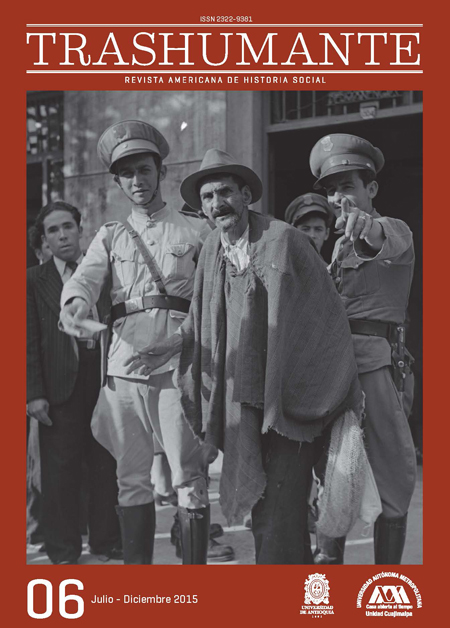The demands of the Sugar Trade Unionism: Between the Open Protest and the Instances of Reconciliation. Tucumán, 1944-1949
DOI:
https://doi.org/10.17533/udea.trahs.n6a06Keywords:
unionism, sugar industry, Peronism, protest, negotiation, Tucumán.Abstract
Between the military coup of 1943 and the fall of the Peronist government in 1955, the organizational and negotiating capacity of the Argentinean working class suffered a major shift. The aim of this paper is to rethink the dynamics of trade unions in the sugar industry in Tucuman from the study of the repertoires of labor confrontation, as well as the arbitration instances promoted by the provincial and national government and encouraged by state agencies. In this sense, the tensions arising between the bases and the union leadership on how to demand, the dilemma between the strike or the negotiation and the implementation and reformulation of conciliation channels are the central issues of this paper.
Downloads
References
FUENTES IMPRESAS
Schleh, Emilio. Compilación legal sobre el azúcar. Tomo XI. Buenos Aires: Imprenta Ferrari, 1947.
Schleh, Emilio. Compilación legal sobre el azúcar. Tomo XIII. Buenos Aires: Imprenta Ferrari, 1948.
PERIÓDICOS Y REVISTAS
La Gaceta (Tucumán) 1945-1946.
Trópico (Tucumán) 1947-1949.
La Industria Azucarera (Buenos Aires) 1945-1947.
BIBLIOGRAFÍA
Bravo, María Celia. “Los dilemas de la ‘cuestión social’. Liberales, socialistas, Iglesia y patrones frente a la situación de los trabajadores en Tucumán”. La cuestión social en Argentina, 1870-1943. Comp. Juan Suriano. Buenos Aires: La colmena, 2000.
Bravo, María Celia. Campesinos, azúcar y política: cañeros, acción corporativa y vida política en Tucumán, 1895-1930. Rosario: Prohistoria, 2008.
Bravo, María Celia y Florencia Gutiérrez. “La política azucarera argentina: de la concertación sectorial al tutelaje estatal (1928-1949)”. H-Industria [En prensa].
Doyon, Louise. Perón y los trabajadores. Los orígenes del sindicalismo peronista, 1943-1955. Buenos Aires: Siglo XXI, 2006.
Girbal-Blacha, Noemí. “Economía azucarera tucumana, empresarios y crédito en tiempos del Estado peronista (1946-1955)”. La invención del peronismo en el interior del país. Eds. César Tcach y Darío Macor. Santa Fe: Universidad del Litoral, 2003.
Gutiérrez, Florencia. “La dirigencia de FOTIA y los sindicatos de base: tensiones y conflictos en el proceso de sindicalización azucarero. Tucumán, 1944-1955”. El primer peronismo en Tucumán. Avances y nuevas perspectivas, Coords. Florencia Gutiérrez y Gustavo Rubinstein. Tucumán: EDUNT, 2012.
James, Daniel. Resistencia e integración. El peronismo y la clase trabajadora argentina. Buenos Aires: Sudamericana, 2006.
Kindard, Adriana. Alianzas y enfrentamientos en los orígenes del peronismo jujeño: estructura de poder – partidos políticos. Jujuy: Universidad Nacional de Jujuy, 2001.
Mackinnon, Moira. “El protagonismo del movimiento obrero tucumano en la formación del Partido Peronista (1945-1950)”. Formas tempranas de organización obrera. Eds. Sergio Grez Toso y otros. Buenos Aires: La Crujía-Instituto Torcuato Di Tella, 2003.
Prol, Mercedes. “Peronismo, élites políticas e instituciones de gobierno, 1943-1952”. Ponencia presentada en IX Jornadas Interescuelas-departamentos de Historia, Universidad Nacional de Córdoba, 2003.
Rubinstein, Gustavo. Los sindicatos azucareros en los orígenes del peronismo tucumano. Tucumán: Travesía/ Universidad Nacional de Tucumán, 2006.
Schiavi, Marcos. “Algunas consideraciones sobre el poder obrero y productividad en el primer peronismo: la mirada de los industriales metalúrgicos”. Trabajadores y empresarios en la Argentina del siglo XX: indagaciones desde la historia social. Comps. Daniel Dicósimo y Silvia Simonassi. Rosario: Prohistoria, 2011.
Ullivarri, María. “Sindicatos en la ‘capital del azúcar’. Organización y lucha en el mundo del trabajo de la provincia de Tucumán (Argentina), 1930-1943”. Historia Agraria 55 (2011): 105-137.
Downloads
Published
How to Cite
Issue
Section
License
El contenido publicado por la revista está disponible para ser utilizado bajo la licencia internacional Creative Commons Reconocimiento-NoComercial-SinObrasDerivadas 4.0.










